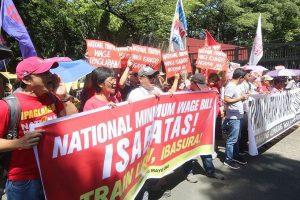
Philippine minimum wage highest in region, commission testifies
DAILY PAY rates in the Philippines are the highest in the region, a wage commission official told a congressional hearing, though supporters of a legislated wage hike pushed back by saying wages have stagnated for decades.
Maria Criselda R. Sy, National Wages and Productivity Commission executive director, said at a House hearing on Wednesday that the Philippine minimum wage of $10.85 or P610 per day in the National Capital Region (NCR), though pay tended to be lower in regions hosting export zones.
“The Philippines has the highest daily minimum wage rate in ASEAN (Association of Southeast Asian Nations) when compared to Malaysia ($10.50), Indonesia ($10.41), and Thailand ($9.84),” she said, adding that “export hubs such as Region IV-A ($9.25), III ($8.89), VII ($8.33), and XI ($8.22) are very competitive” compared to low-cost manufacturing hubs like Cambodia and Vietnam.”
As a counterpoint, Representative Raymond Democrito C. Mendoza, a Party-list legislator with the Trade Union Congress Party, also testified that base pay has stagnated over the past 35 years.
“The P89 minimum wage rate across all regions in 1989 only amounts to P609 today,” he said. “This (is only equivalent) to the highest regional rate for non-agricultural workers in NCR.”
Mr. Mendoza added that the average minimum wage of all regions is only P440, which “indicates that the wage rates even regressed when compared to the pay rates received by workers in 1989.”
Business groups have warned that a legislated wage increase will deter foreign investors and hurt Philippine businesses.
“ECoP (the Employers Confederation of the Philippines) opposes across-board and uniform wage increases across regions as these may not only worsen inequality but likewise impact the attractiveness of other regions for labor-intensive industries and enterprises,” ECoP Vice-President Antonio L. Sayo said at the hearing.
He noted that increasing minimum wages reduces the profitability of businesses investing in the country, which could make it “less appealing for foreign investors, potentially decreasing foreign direct investment.”
Micro, small and medium enterprises, which comprise 99% of the country’s business establishments, will also bear the brunt of the proposed wage hikes, which could lead them to stop hiring workers to reduce labor costs.
He also noted that the cost of doing business is different for every region, which was the justification for creating the current regional wage board setup.
“Higher wages entail increased labor costs for businesses, and when businesses have to pay more, they may have to cut elsewhere to maintain profitability,” Mr. Sayo said. — Kenneth Christiane L. Basilio



